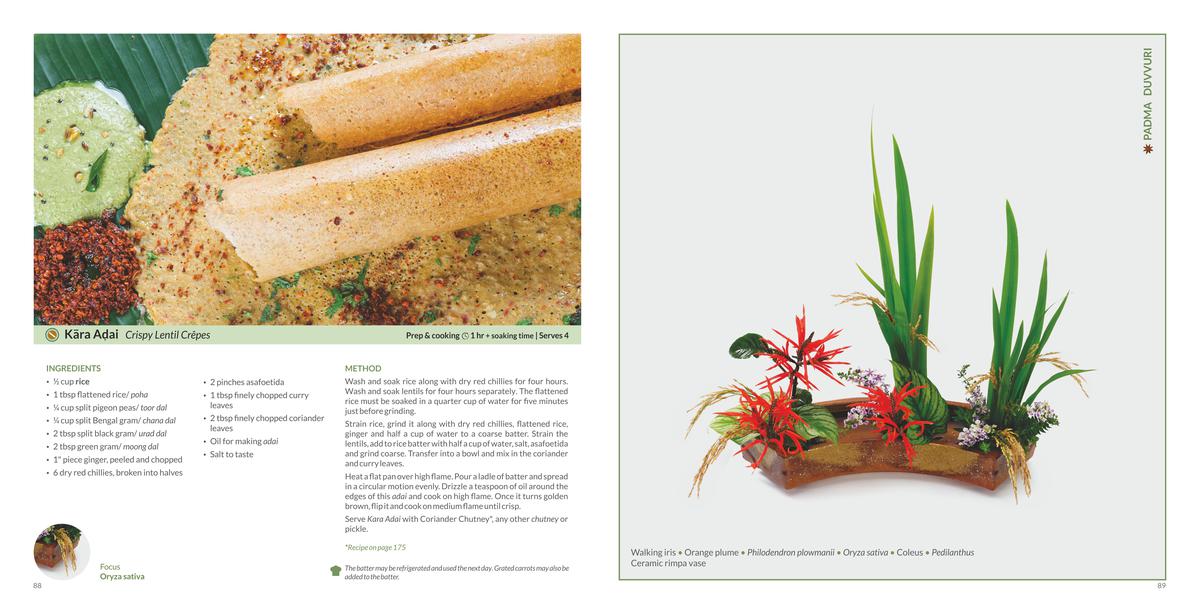The coffee table book, ‘Mishrana’, facilitates a meeting point of recipes of India and Ikebana, the Japanese art of floral arrangement
The coffee table book, ‘Mishrana’, facilitates a meeting point of recipes of India and Ikebana, the Japanese art of floral arrangement
Mishrana means blend and a coffee table book thus titled features a medley of floral arrangements and recipes from Indian cuisine. Seventy five Ikebana practitioners, a majority of them from Hyderabad, have contributed an Ikebana arrangement and a corresponding recipe each, to commemorate the 75th year of India’s independence and to mark the 70th year of Indo-Japanese relations. Co-authored and co-edited by Rekha Reddy, Indumathy Davloor, Padma Duvvuri and Nirupa Reddy, Mishrana celebrates both Indian cuisine and Ikebana, the Japanese art of floral arrangement.
A Telugu favourite such as the palli karam podi (savoury peanut powder) is complemented by an Ikebana arrangement with bougainvillea blooms, philodendron and upturned peanut shoots to reveal the freshly harvested peanuts, in a vintage brass container on a wooden base. To cite another example, Anjeer basundi (fig delight) is matched with an Ikebana arrangement featuring a fig branch with other flowers, leaves and shoots, placed in ceramic vases.
Mishrana book cover
| Photo Credit: Special Arrangement
Rekha Reddy, one of the prominent Ohara Ikebana practitioners in the city, says a vetting process ensured that none of the 75 participants repeated a recipe or an Ikebana arrangement. Participants gave a choice of three recipes and the co-authors selected one, and the recipes were standardised to serve four.
Mishrana was in the making for more than two years, pausing intermittently during the pandemic and the participants waiting for seasonal plants to grow at different times of the year. Rekha explains that it was not as simple as sourcing fruits, vegetables and flowers from the market or depending on a friend’s garden: “One participant grew baby potatoes, while another grew peanuts and yet another eagerly waited for her mustard plants to flower.”
Chef Partha Chakrabarti and chef Suman from Marigold Hotel, Hyderabad, helped in coordinating the food shoots. City-based photographer Arvind Chenji filmed the food and Ikebana arrangement.
The idea for this book came from the Hyderabad practitioners of Ikebana and subsequently, a few others showed interest to be a part of it, says Rekha. “We did not actively reach out to every Indian chapter since that would have become a huge exercise.”
Beginners as well as Ikebana grandmasters from different walks of life — homemakers, doctors, lawyers and artists — have contributed to the book. Mishrana begins with recipes and floral arrangements by Shamala Y R Reddy, Shyamala Ganesh, Sita Sastry V and Mythili Ramaswamy, enthusiastic women in their 70s and 80s, and the rest of the book lists Ikebana practitioners in an alphabetical order.
The base material — cast iron pans, wooden logs, paniyaram pans, ceramic plates and vases, and the simple banana leaf, is as varied as the recipes, leaves, flowers, twigs, pods and seeds.
Earlier, Rekha and other Ikebana practitioners had brought out a book titled Blooms and Looms, drawing a parallel between floral arrangements and textiles.
(Mishrana is priced at ₹1200 and available at The Paper Planes Shop (shop.joinpaperplanes.com/). For details, email pushpampublications@gmail.com)

























